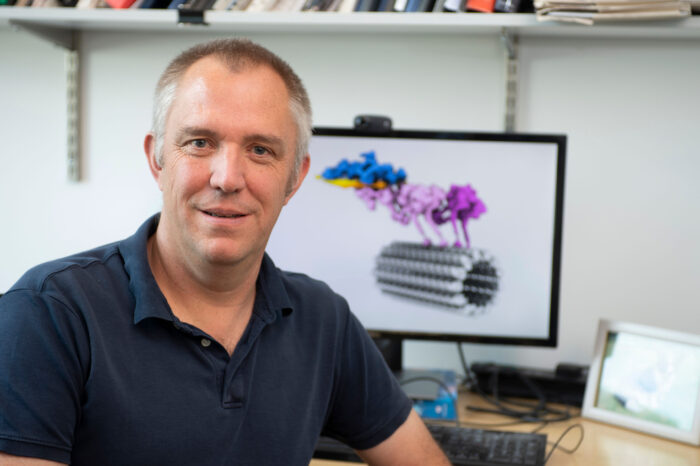
Andrew Carter, Group Leader in the LMB’s Structural Studies Division, is the 2023 recipient of the Hooke Medal from the British Society for Cell Biology in recognition of his contribution to the advancement of cell biology knowledge.
The Hooke Medal is awarded annually to an outstanding cell biologist based predominantly in the UK or Ireland within 14 years of starting their own group. The award, first given in 2000, is named in honour of Robert Hooke, the 17th century natural philosopher and author of the world’s first comprehensive illustrated book on microscopy, ‘Micrographia’. Winners of the Hooke Medal are invited to deliver a prize lecture, and also receive a medal – designed by the LMB’s emeritus scientist, Brad Amos – depicting Robert Hooke’s microscope and the cork cells he described. Previous LMB winners include Anne Bertolotti and Ben Nichols.
Andrew has been a Group Leader at the LMB since 2010. His research is focused on understanding the structure and mechanism of dynein; a large complex of motor proteins responsible for moving and organising the contents of eukaryotic cells along tracks which make up the cytoskeleton. Recently, his group have discovered a novel protein which packages dynein motors for delivery into the cilia (slender cellular extensions of the lungs which beat to ensure clear pathways for air), and used electron cryo-microscopy (cryo-EM) to reveal the first high-resolution structure of the dynein-dynactin complex bound to microtubules, showing how dynein motor domains interact.
Andrew received a degree in Biochemistry from Queen’s College, Oxford, then completed a PhD on X-ray crystallographic studies of the bacterial small ribosomal subunit with Venki Ramakrishnan at the LMB. He began his research on dynein as a postdoc with Ron Vale at the University of California, San Francisco, before starting his own group at the LMB. In 2016 he was elected to EMBO membership.
Andrew’s Hooke Medal prize lecture will be delivered at the 2023 Dynamic Cell V meeting at Loughborough University in April.
Further references
Andrew’s group page
British Society for Cell Biology press release